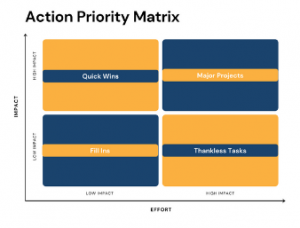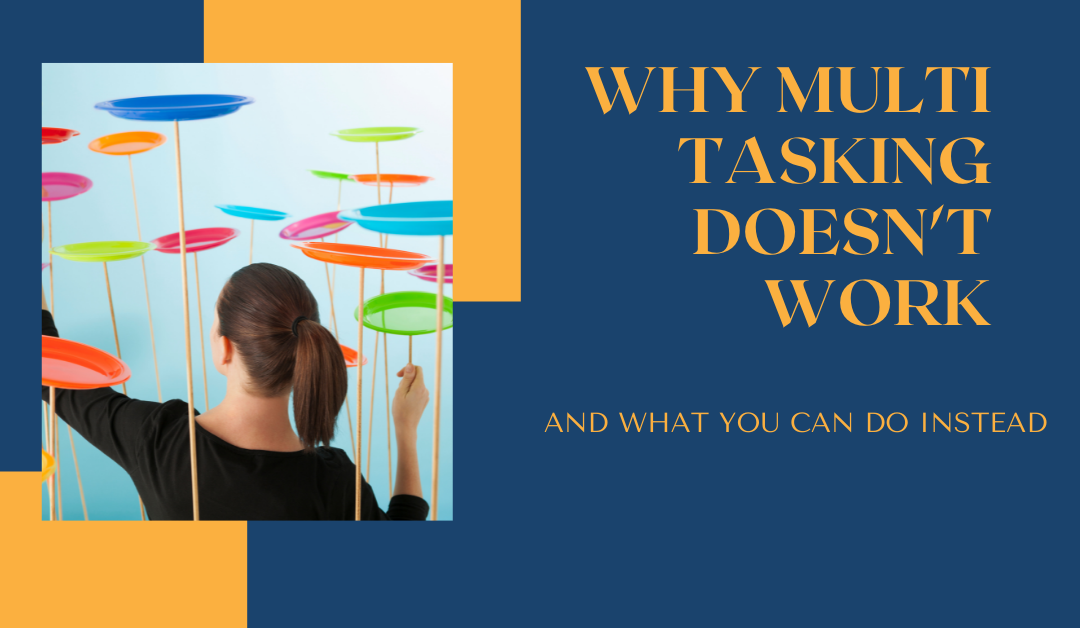Multi-tasking – it’s a popular myth. For too long it’s been perpetuated that the only way to get things done is by trying to do them all at once.
Take it from me: it doesn’t work. More than once I’ve found myself counselling colleagues and associates who are overwhelmed by their to-do lists and tried to do it all at the same time, only to find that all those plates they’ve attempted to keep spinning have all come crashing down around their ears.
Research has shown that when we try to work on several tasks at the same time, we actually get less done. We’re also getting more stressed out and performing far worse than someone who’s doing one task at a time.
I know people who, pre-Pandemic, would have called multi-tasking their superpower. But when we went into lockdown and their workload dropped off, they realised how much more productive they could be when they could spend dedicated amounts of time on one task at a time. Jobs took less time and they made fewer mistakes. Now, I’m not saying the work they’d done before was bad, far from it, but since things have gotten back to normal (or some semblance of it), have found that they’d rather eat their socks than go back to their old ways!
If you’re a habitual multi-tasker, try some of the below tips to see if they help you.
- Schedule schedule schedule!
It’s easy to get bogged down if you don’t have a set routine through your workday. Set aside time for each task you need to get done and add it into your calendar. When the time comes for you to work on that job, ONLY work on that task. If you find it tricky to focus, try using the Pomodor app to work in 25-minute time blocks. This is really helpful if you find yourself constantly worrying about when you’re going to get a specific job done – knowing it’s in your schedule with an appropriate amount of time allocated to it means you can forget about it until your calendar reminds you that it’s time to start.
- Minimise interruptions
If you have a tendency to be reactive, looking at every mail, WhatsApp and notification as it comes in, STOP IT! The world isn’t going to end if you haven’t responded to someone’s request in 30 seconds.
With the above point in mind about scheduling, put times in your day when you’re going to check your phone and emails, and then turn your notifications off. Those pings and beeps can really eat into your concentration and mean you spend longer on each job. If your clients are used to you responding to things quickly, set a few boundaries and let them know if you’re not going to be available (and if that makes you feel uncomfortable, let them know when you will be around). Then, crucially, stick to those boundaries until they become a habit.
- Create an action priority matrix
If you’re looking at that to-do list and can’t work out where to start, think about using an action priority matrix to help you decide what you should prioritize, and what you could leave till later in your day (or delegate, if that’s appropriate).
Look at your list and give everything a score from 1-10, for Impact and for Effort, then plot it on the below graph to work out which quadrant it falls into: Quick Wins, Major Products, Thankless Tasks, or Fill Ins, then plan your day accordingly.

- Identify your peak performance time
Keep a diary for a couple of days and keep an eye on when you’re at your most productive. Obviously this differs for each person (I know someone who finds they’re most productive at 4pm on a Friday, which is the polar opposite of a colleague who can whizz through tasks at 8am every day), but once you’re aware of your peak performance time, make sure you ringfence that time block for the most important things you need to get done that day.
- Batch tasks together
Take another look at your to-do list. If there are any jobs on there that could fall under similar broad headings, do them in a row so that your brain is ‘clicked in’ to the job at hand. If you break your day up switching back and forth between noticeably different activities, you’re forcing your brain to pivot more. If you can, stay in ‘the zone’ until you’ve got all those similar tasks done!
I hope that’s been useful. Spinning plates is all well and good, but at the end of the day, a matching set of broken crockery is no good to anyone!
Until next time!
Stay productive.

